50+ Catchy Facebook group name ideas to grow your community
The sheer number of people on Google, Reddit threads, and Quora asking, “What should I name my Facebook group?” proves that naming a community is a common struggle.
If you’re also fed up scouring the internet for name ideas, maxing out Facebook group name generators, and still coming up empty, stay with us!
In this article, we’ll guide you through the best practices for naming your community and share 50+ Facebook group name ideas to spark your creativity.
But first, let’s explore why you should put extra thought into your Facebook group’s name.
Why Facebook group names matter for community growth
According to Facebook data from 2020, over half of Facebook users belong to five or more active groups. Since Covid, the popularity of online communities has skyrocketed. People flock to them because virtual communities fill in the connection gap when real life sometimes fails to deliver.
But with so many communities out there, standing out is tough.
Your group’s name, however, can be one of the easiest ways to spark interest and draw in curious minds. In fact, it’s often the first (and sometimes, only) thing people see before clicking “join.”
If your name is boring or doesn’t promise anything exciting, forget about growth. Meanwhile, a great Facebook group name can help you with:
🔍 Discoverability
Unless you plan to drive members to your group through other channels, you’ll rely on good ol’ Facebook search for discoverability. That’s why your group’s name matters. It needs to target keywords people are searching for.
🔗 Shareability
Brevity always wins.
The best brands out there? They’re usually rocking one or two-word names. Sure, your group name can be a little longer, but the shorter, the better.
If people are saying, “Let me check what it’s called,” you’ve already lost the game.
A memorable name is easy to recall, easy to recommend, and makes growing through word-of-mouth effortless. Simple as that.
📣 Cross-promotion
Your group name can also double as a natural extension of your brand across platforms like Instagram, YouTube, or LinkedIn.
A name that’s both memorable and aligned with your group’s purpose makes it easier to cross-promote and integrate your community into your broader digital presence.
How to choose the perfect Facebook group name
Picking the right Facebook group name is both an art and a science.
You want it to be easy on the ear, but there are also some technical considerations to keep in mind. Let’s unpack them.
Name length best practices
Facebook allows up to 75 characters (without spaces) for group names, but shorter names are almost always better. And they’re more brandable!
💡 Pro tip: Don’t use abbreviations or complicated words unless they are well-known (like “SEO” for search engine optimization).
Using keywords for discoverability
Next, think about the words your ideal members might type into the Facebook search bar. For instance, if your group is about small business tips, include “small business” or “entrepreneur” in the name.
Facebook calls these keywords “popular words related to your community's subject matter expertise.”
If you don’t include these keywords, it’ll be difficult for potential members to discover your community organically through Facebook search.
Incorporating your niche/topic
Your group name should make it clear what it’s about so people know right away if it’s for them. You don’t want random people joining just because the name doesn’t explain what your group is about.
See what we mean in the table below:
| Name pair | What works and what doesn't | ||||||||||||||||||||||||||||||||||||||||||||||||||||||||||||||||||||||||||||||||||||||||||||||||||
|---|---|---|---|---|---|---|---|---|---|---|---|---|---|---|---|---|---|---|---|---|---|---|---|---|---|---|---|---|---|---|---|---|---|---|---|---|---|---|---|---|---|---|---|---|---|---|---|---|---|---|---|---|---|---|---|---|---|---|---|---|---|---|---|---|---|---|---|---|---|---|---|---|---|---|---|---|---|---|---|---|---|---|---|---|---|---|---|---|---|---|---|---|---|---|---|---|---|---|---|
| “Entrepreneur Network” vs. “Startup Women Scaling Globally” | The first is too broad, while the second specifies both the audience (women in startups) and purpose (scaling globally). | ||||||||||||||||||||||||||||||||||||||||||||||||||||||||||||||||||||||||||||||||||||||||||||||||||
| “Learning Language Together” vs. “Learn Spanish with Native Speakers” | The first is too broad, while the second focuses on a specific niche (learning Spanish with or from native speakers). |
You get the gist?
Balancing creativity with clarity
Finally, while a unique name can grab attention, clarity should always come first. If people can’t instantly understand what your group is about, they may scroll right past it.
Here are a few examples of balance:
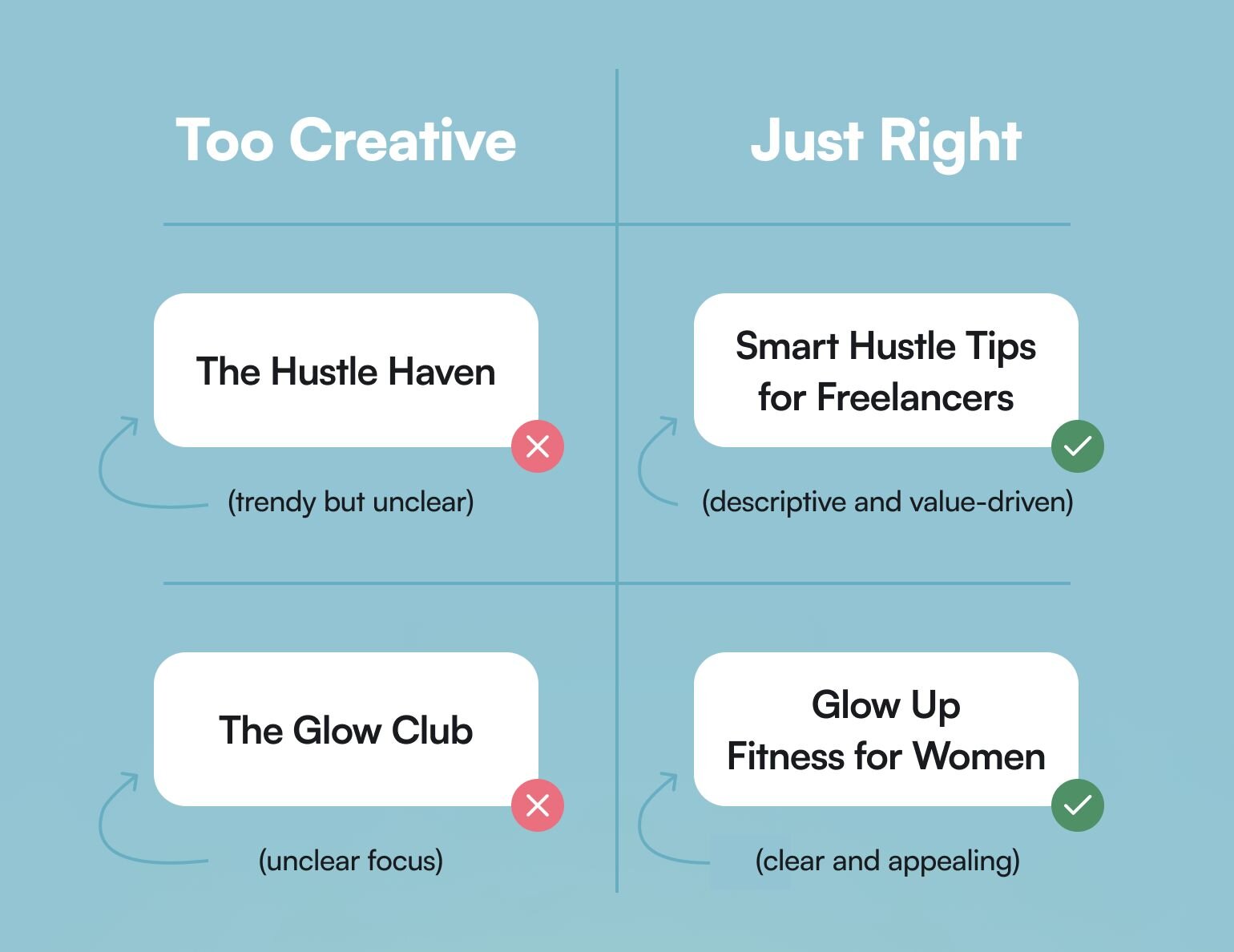
Let’s look at some actual Facebook group names so you can better understand how these names come together.
Types of Facebook group names (with examples)
Topic-focused names
Perfect for creating a group with a clear purpose, these names highlight a specific interest, hobby, or theme, making it easy for like-minded people to find and join the community.
For instance, “Soft Productivity Collective” is a Facebook community designed for free-spirited entrepreneurs who value balancing creativity with productivity.
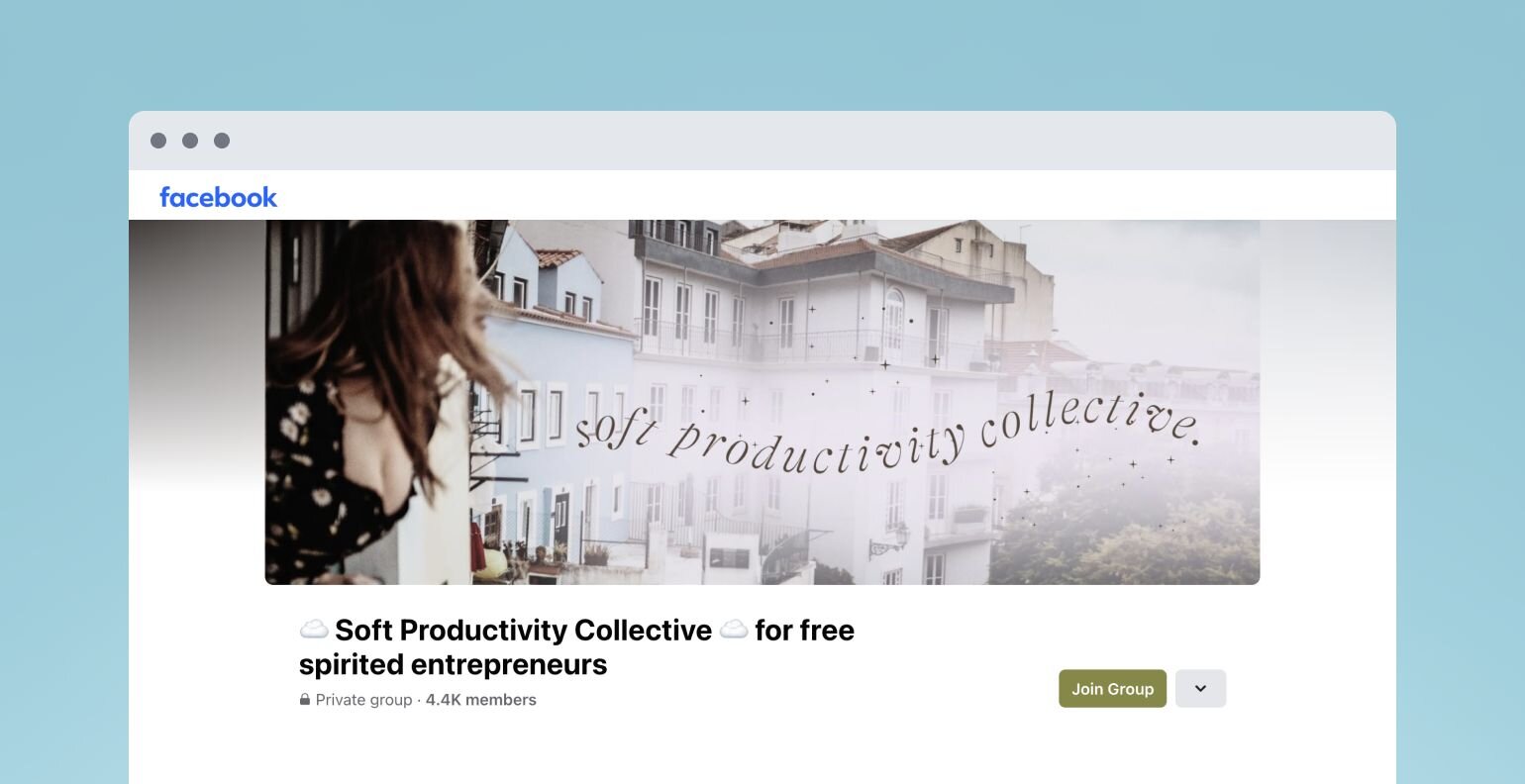
Other topic-focused group name examples (from Circle’s Discover network):
- “Productivity Lab” by Ali Abdaal
- “PregnaHub” by Emiliana Hall
- “Guitar Playback Academy” by David Wallimann
Problem-solving names
Groups with these names are designed to address a specific challenge or need, offering solutions and support.
One such group is “Tenancy Matters UK”— a Facebook community that offers support and guidance for tenants and landlords in the United Kingdom.
While the name might not be explicitly solution-focused, the group’s banner fully reinforces the community’s mission.
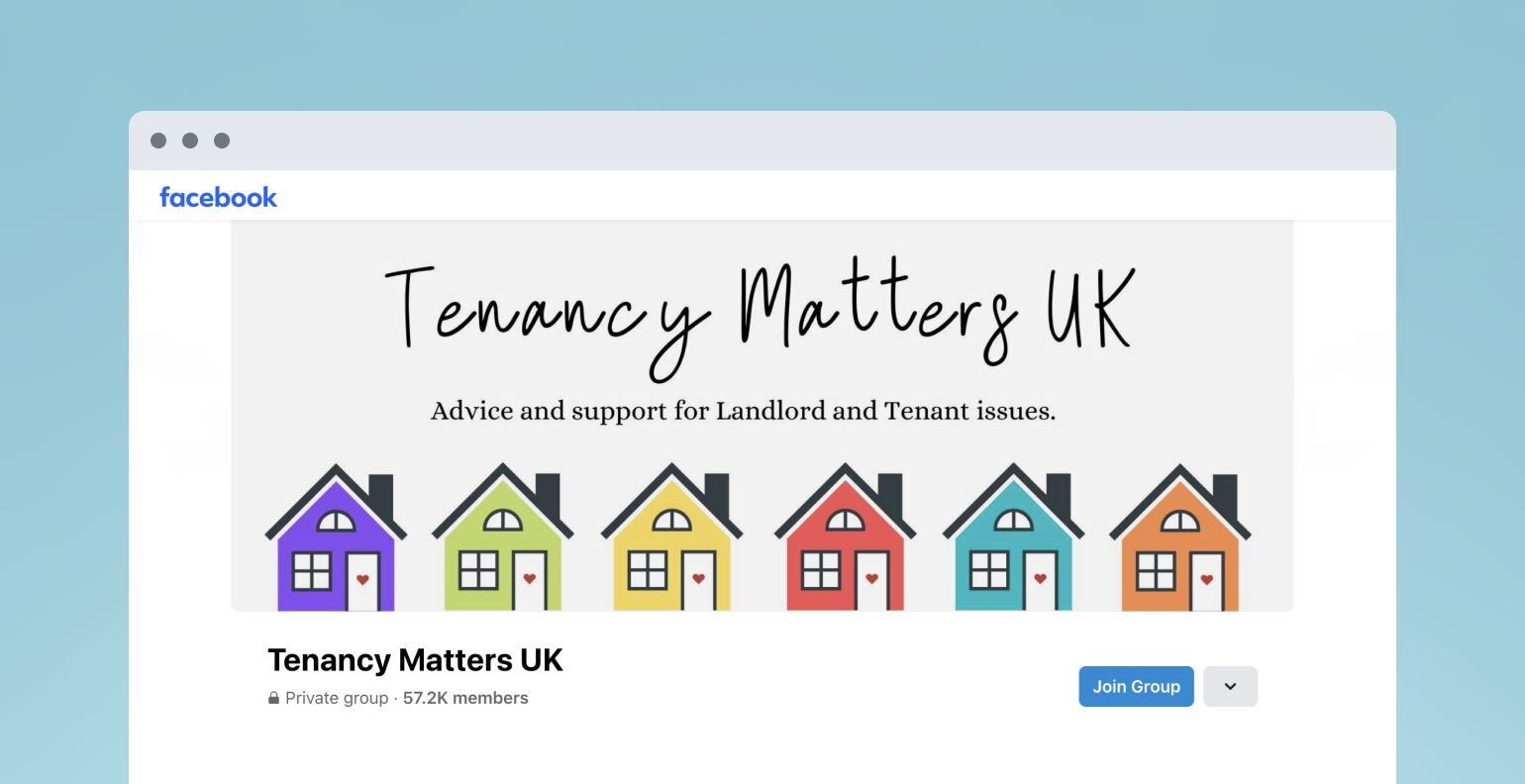
Other problem-solving group name examples (from Circle’s Discover network)
- “Gold Swing Simplified” by Tom Saguto
- “7 Steps to Writing Winning Grants” by Meredith Noble & Alex Lusting
- “21-Day Metabolic Reset” by Susan Ohtake.
Industry/profession-based names
Typically, these names target professionals in a specific field, providing a space for knowledge exchange, collaboration, and networking.
An excellent case point is this community for coaches, consultants, and course creators👇

Other industry or profession-based group name examples (from Circle’s Discover network):
- “The Pilot Institute Premium Drone Community” by Greg R.
- “10X Designers” by Fons Mans
- “Disruptive HR” by Lucy Adams.
Location-specific community names
Now if you’re looking to build a community centered around a specific location, incorporating the name of that place can make it instantly relatable.
Take inspiration from an international girls' community in Madrid (Spain). They use the city’s name to help make the community feel connected to its location.
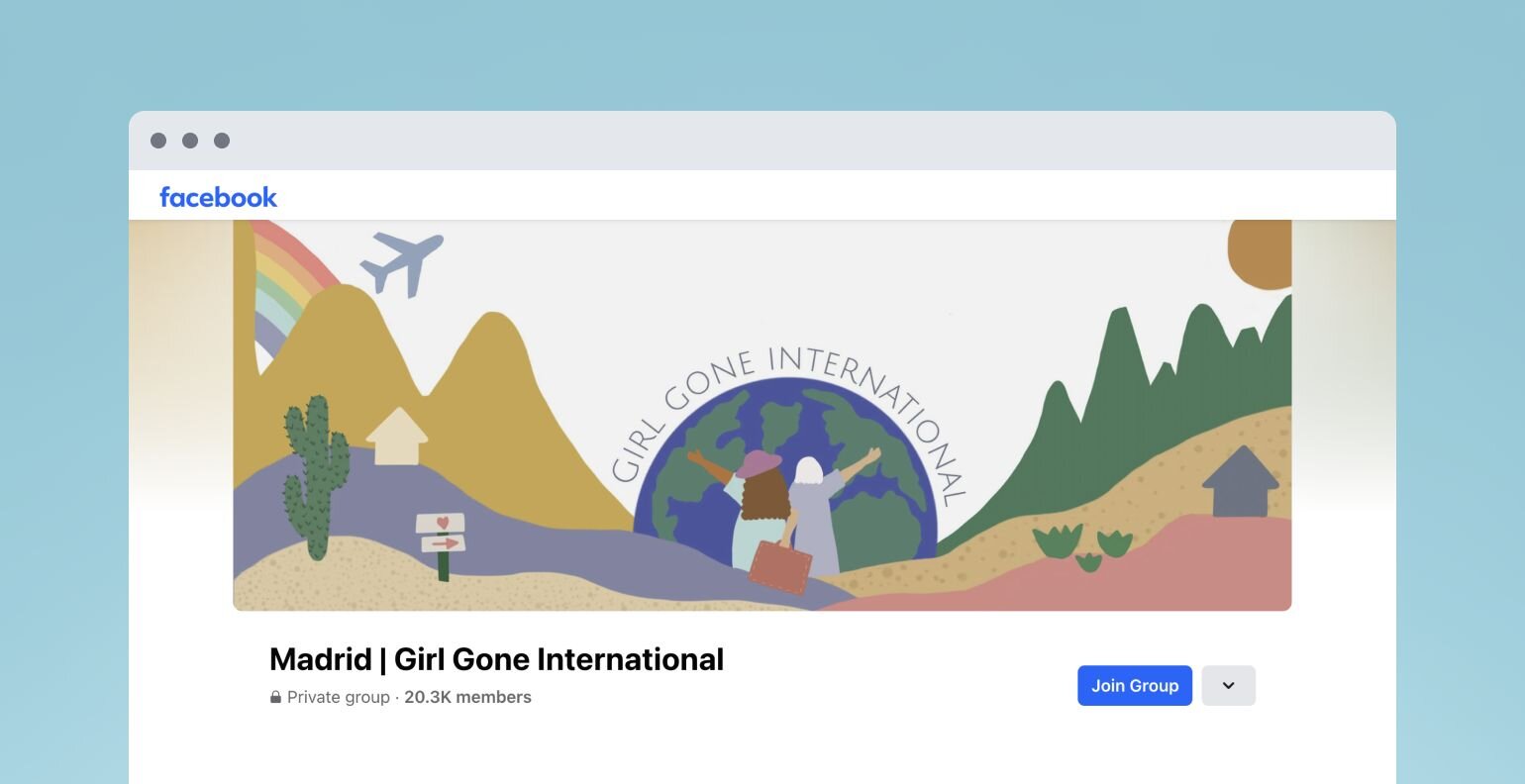
Aspirational/lifestyle names
These names reflect a desired way of life, goals, or values, attracting members who resonate with the same aspirations or lifestyle choices.
A Facebook group called "Financial Independence & Retire Early (FIRE)" is a perfect illustration of an aspirational name:
![A Facebook group page for 'Financial Independence & Retire Early [FIRE]', showing a minimalist black and red logo. The group is marked as private with 7.7K members.](https://cdn.builder.io/api/v1/image/assets%2Fd5e2d72a033944e1a916c5c34902a1ff%2F2f8346f4caf54374a44c6342144f34a5)
50+ Facebook group name ideas by category
Examples—check! Now, let’s get to the name ideas.
We’ve divided them into five categories. You can jump straight to the most relevant section or browse through them all.
You might love two words from one idea, one from another, and then add your own twist. Before you know it—voilà!—you’ve got the perfect name to bring your people together.
Business & entrepreneurship
- Solopreneur Success Hub
- Creative Brand Builders
- Ecom Growth Secrets
- Freelance Freedom Network
- Green Business Innovators
- Women Startup Circle
- Tech Startup Titans
- Remote Work CEOs
- Side Hustle Builders
- Passive Income Architects
- Service Biz Mastery
- Crypto Entrepreneurs Collective
Health & wellness
- Easy Home Workouts
- Healthy Habits League
- Clean Eating Collective
- Busy Person’s Meal Prep
- Pure Homemade Beauty
- Simple Self-Care Tips
- Fitness Accountability Club
- Virtual Fitness Coach for Busy Women
- Prioritize Gut Health
- Wellness Over 40
- Balanced Hormones=Balanced Life
- The Clean Beauty Club
Hobbies & interests
- Budget Travelers’ Hacks
- Rare Finds Collectors’ Community
- Board Game Strategists’ League
- Amateur Writers’ Accountability Club
- True Crime Enthusiasts’ Community
- Become a Decent Photographer in 30 Days
- The Mindful Gardener: Gardening Tips & Tricks
- Home Bakers with a Sweet Tooth
- Knitters & Weavers Circle
Parenting & family
- Young Moms Navigating Motherhood
- Parenting Toddlers Without the Chaos
- The Parent’s Community for Raising Confident Teens
- Everything About Homeschooling in the US
- Co-parenting with Positivity
- Outdoor Families in Canada
- Working Parents’ Club
- New Parent Life Hacks
Education & learning
- Learn Spanish Through Conversation
- Everyday French for Beginners
- High School Study Hacks
- First-Gen College Students
- Learn the Code
- Women Learning to Code
- SEO Made Simple for Content Writers
- Future CPAs Study Group
- Flight School Support Hub
- Social Media Content Creators’ Club
- DIY Designers Learning Graphic Skills
- Future Doctors’ Network
Beyond the name: setting your community up for success
We focused a lot on the name. But what truly makes your community thrive is how you deliver on the promise behind that name.
Sure, Facebook groups are a solid starting point, but their limits start to show when you’re trying to bring your A-game and deliver serious value to your community.
If you’re all-in on building a thriving community, Facebook just might not cut it in the long run.
Facebook groups’ blindspots
Facebook groups offer a basic framework for connecting with members, but they come with significant constraints:
- Algorithmic control: Facebook decides who sees your posts, meaning your content may not reach all your members.
- Poor organization: Important conversations and resources disappear into the feed. Good luck digging them back up!
- Lack of branding options: Every group looks the same, making it hard to reflect your unique identity. It’s just not fun!
- No control over member information: Want to email your members or set up other tools? Good luck.
Communities outgrow Facebook groups
As your community grows, your needs as a community manager become more complex. You need a better way to organize posts, resources, and discussions.
You also need scalable member engagement tools to create meaningful interactions without overworking yourself to death.
And let’s not even start talking about monetization options.
Eventually, you need something more robust
When Facebook Groups start holding your business back, it’s only natural to start exploring other options.
Options that let you run your community your way. Where you call the shots, own your data, and create the kind of experience your members actually deserve. Where you’ve got tools for hosting discussions, running events, offering courses—basically, all the things that make your community thrive.
If you’re cool with being a “meh” community, then sure, stick with what you’ve got. But if you’re serious about building something vibrant and scalable, keep reading.
Why consider Circle for your growing community
Circle is an all-in-one platform that lets you build and launch your own branded community—a space you truly control.
When your community lives on Facebook, you are subject to that platform's whims–instead of your own needs. Plus, Meta’s recent decision to replace independent fact-checkers with a “community notes” system might make this the right time to move your community off Facebook.
Because, what serious community builder wants to live in constant worry that your group’s future is tied to a platform that can change something as important as safety guidelines at the drop of a hat?
With Circle, you can finally put your community in your hands and make it work for you. Here’s what you get:
👉 Your brand, front and center: Customize everything from logos to colors so your space feels 100% yours.
👉 Engagement that works: Discussion spaces, personalized feeds, gamification, newsletters, and mobile apps make it easy for members to stay active.
👉 Ways to make money: Subscriptions, paywalls, and upsells—monetizing your community doesn’t get simpler than Circle.
👉 Live event tools: Run workshops, streams, or Q&As all from the same platform.
👉 A clear view of your progress: The analytics hub tracks engagement, growth, and revenue, so you can see what’s clicking.
Communities like ExitFive, Soulcial Mate, and Juicy Parenting have moved to Circle for more control and better tools. And they love it!
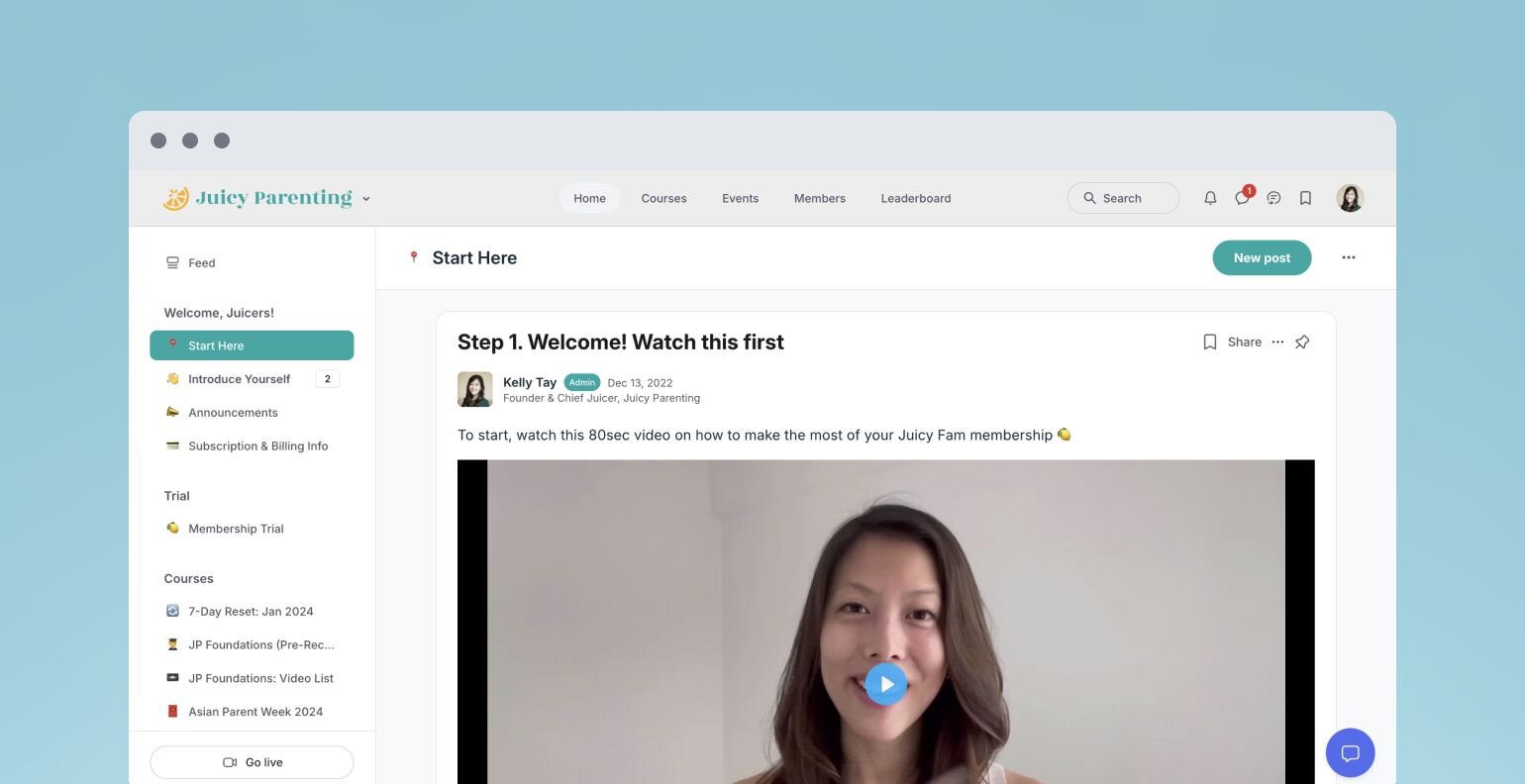
That said, you might not be ready for Circle yet—and that’s okay.
If your community is still in its early days or you’re figuring out what works, sticking to a simpler setup might make sense for now. Circle is great when you’re ready to level up, with everything you need to keep your members engaged, make money, and grow in one easy platform.
“As someone who started my membership community in a Facebook group and now has almost 200 paying members, I think Facebook Groups and Whatsapp are great for entry-level community spaces. However, eventually, you may run into the need for more features, organization, and professionalism, which is why I ultimately moved to a Circle community.”
- Kristen Bousquet, Founder of Your Soulcial Mate
From naming your Facebook group to scaling your community
Finding that perfect Facebook group name idea is an important step. The right name sets the tone, attracts the ideal members, and lays the foundation for your group’s growth.
As your community grows, you may find that Facebook groups no longer meet your needs.
When that time comes, Circle will bring together your members, discussions, events, courses, and content—all in one place, under your own brand. Plus, you get access to our customer community full of handy resources and over 13,000 community builders on the same journey as you.